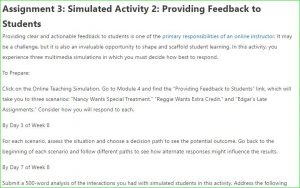Assignment 3: Simulated Activity 2: Providing Feedback to Students
Providing clear and actionable feedback to students is one of the primary responsibilities of an online instructor. It may be a challenge, but it is also an invaluable opportunity to shape and scaffold student learning. In this activity, you experience three multimedia simulations in which you must decide how best to respond.
To Prepare:
Click on the Online Teaching Simulation. Go to Module 4 and find the “Providing Feedback to Students” link, which will take you to three scenarios: “Nancy Wants Special Treatment,” “Reggie Wants Extra Credit,” and “Edgar’s Late Assignments.” Consider how you will respond to each.
By Day 3 of Week 8
For each scenario, assess the situation and choose a decision path to see the potential outcome. Go back to the beginning of each scenario and follow different paths to see how alternate responses might influence the results.
By Day 7 of Week 8
Submit a 500-word analysis of the interactions you had with simulated students in this activity. Address the following questions in your analysis:
- Which choices led to better outcomes for each student? Explain why.
- Which choices led to worse outcomes for each student? Explain why.
- What insights did you gain from this activity?
Providing Feedback to Students
Reggie Wants Extra Credit
In this scenario, Reggie wants extra credit to boost his overall grade from 83 percent to 90 percent. The professor assesses the situation and determines that Reggie can attain 90 percent on his grades without getting extra credit. The feedback from the professor’s responses guided Reggie towards taking complete responsibilities for the grade he gets.
The professor was able to attain this by maintaining his original boundary of not offering extra credit option. In addition to this, the professor was able to provide Reggie with an alternative solution which will also be beneficial to the entire class.
The professor’s approach offered the best outcome for the student because it helps the student take responsibility for his actions while sticking to his initial decision of not offering extra credit options for all the students. The worst choice in this instance would be telling him to communicate with his classmates to discuss if they would be willing to take the extra credit option and then offering extra credit assignment.
This choice would have set a dangerous precedent where students will be requesting 0mfor extra credit assignments whenever they do not perform well on their assignments. From this assignment, I was able to learn how to deal with students who want additional assignment in order to boost their overall grade.
I learned that it is better to encourage such students to work smart on their weekly assignments so that they do not require extra credit assignments to boost their grades.
Nancy Wants Special Treatment
In this scenario, Nancy wants the professor to be reviewing her class assignments because she feels that her classmates are not able to offer an in-depth review and response to her work. The professor looks at the situation and determines that Nancy should work communicate with her peers so that she can discuss her issues and develop a solution that they can apply moving forward.
This is the best solution in this scenario. By allowing Nancy to follow the best practices, the professor is able to create the best possibility for the students to resolve their issues amongst themselves. The worse solution to this scenario would be the professor agreeing to review Nancy’s work.
This would set a bad precedent to the rest of the class and would create a perception that Nancy is superior to the other students. From this scenario, I learned about how to handle students who believe they are intellectually “superior” to the other students.
As an educator, it is my responsibility to direct such students to engage with fellow students and not to look down on them because they believe they don’t have the same intellectual capacity.
Edgar’s Late Assignments
In this scenario, Edgar wants the professor to pardon him for submitting his assignment late. The students offer his explanation stating that he was in Hawaii attaining a wedding of his friend’s brother in law. After assessing the situation, the professor decides to penalize Edgar for the late assignments and also advised him to focus on schoolwork and eliminate unnecessary distractions.
In addition to this, the professor proposes that Edgar schedules his time well so that he will be working within the set time frames and avoid turning in assignments late. This is the best choice since it maintains established policies and protocols regarding late assignments and offers a solution that the student can use in future to avoid this.
The worst choice would be to agree to be Edgar’s “alarm clock” by reminding him of when assignments are due. This would make Edgar complaisant and lazy and dependent on the professor. Through this scenario, I learned about how educators ought to support and guide students with a strong personality.
References
Module 4: Providing Feedback to Students. (2019). Retrieved 12 September 2019, from https://mym.cdn.laureate-media.com/2dett4d//Walden/EDDD/8111/CH/mm/sImulated_oline_classroom/module_4c.html
Module 4: Providing Feedback to Students. (2019). Retrieved 12 September 2019, from https://mym.cdn.laureate-media.com/2dett4d//Walden/EDDD/8111/CH/mm/sImulated_oline_classroom/module_4c.html
Module 4: Providing Feedback to Students. (2019). Retrieved 12 September 2019 https://mym.cdn.laureate-media.com/2dett4d//Walden/EDDD/8111/CH/mm/sImulated_oline_classroom/module_4c.html
Also check: Assignment 2: Simulated Activity 1: Supporting Students
